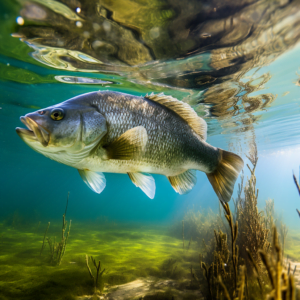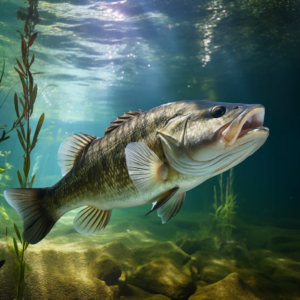Have you ever wondered how much protein is found in black sea bass? This popular fish is not only delicious, but it also packs a nutritional punch. In this article, we will explore the protein content of black sea bass in detail, giving you a better understanding of its nutritional value. So, if you’re curious to learn more about the protein content of black sea bass, then keep reading!
Black sea bass is known for its high protein content, making it an excellent choice for a healthy and balanced diet. Protein is an essential nutrient that plays a vital role in various bodily functions, including muscle growth and repair, enzyme production, and hormone regulation. It also helps to keep you feeling full and satisfied, making it an important component of any weight management plan.
The protein content of black sea bass is impressive. On average, a 100-gram serving of black sea bass contains approximately 20 grams of protein. This amount can vary slightly depending on factors such as the size and age of the fish, as well as the method of preparation. Including black sea bass in your diet can be an excellent way to increase your protein intake and support your overall health and well-being.
In conclusion, black sea bass is a great source of protein, with approximately 20 grams found in a 100-gram serving. Its high protein content makes it an ideal choice for those looking to increase their protein intake and enjoy a delicious and nutritious meal. So, if you’re looking for a tasty and protein-rich seafood option, consider adding black sea bass to your menu. In the next section, we will dive deeper into the nutritional benefits of black sea bass, so stay tuned!
The Protein Content of Black Sea Bass
Introduction to Black Sea Bass
Black sea bass is a popular and delicious fish found in the Atlantic Ocean, particularly along the East Coast of the United States. This species of fish is known for its delicate flavor and firm texture, making it a favorite among seafood enthusiasts. Besides its culinary appeal, black sea bass is also a good source of essential nutrients, particularly protein.
What is Protein?
Protein is one of the three macronutrients required by the human body, along with carbohydrates and fats. It is made up of amino acids, which are the building blocks of life. Protein plays a crucial role in various physiological processes, including muscle building, tissue repair, and immune system function.
Importance of Protein in Diet
Protein is an essential nutrient that the body needs to function properly. It is especially important for athletes and active individuals, as it is involved in muscle growth and repair. Protein also helps to regulate hormones, enzymes, and antibodies in the body. Additionally, it contributes to feelings of satiety, making it a valuable component in weight management.
Understanding Protein Content in Black Sea Bass
The protein content of a food item refers to the amount of protein it contains per serving. When it comes to black sea bass, the protein content can vary depending on whether the fish is consumed raw or cooked. It is important to note that cooking methods can potentially affect the protein content of any food.
Protein Content in Raw Black Sea Bass
On average, raw black sea bass contains around 19 grams of protein per 100 grams. This makes it a relatively high protein fish compared to other seafood options. However, it is worth mentioning that the protein content can vary slightly depending on factors such as the size and age of the fish.
Protein Content in Cooked Black Sea Bass
When black sea bass is cooked, the protein content remains relatively unchanged. This means that the nutritional benefits of black sea bass can still be enjoyed regardless of how it is prepared. Whether you choose to grill, bake, or pan-sear your black sea bass, you can be confident that it will still provide a significant amount of protein.
Comparison of Protein Content in Black Sea Bass with Other Fish
In comparison to other fish species, black sea bass boasts a respectable protein content. For instance, salmon has a slightly higher protein content, with around 20 grams per 100 grams. On the other hand, cod fish has a slightly lower protein content, averaging around 18 grams per 100 grams. Overall, black sea bass falls within the range of protein content for most fish.
Health Benefits of Consuming Protein from Black Sea Bass
Consuming black sea bass as part of a balanced diet offers several health benefits. Apart from its contribution to protein intake, black sea bass is rich in omega-3 fatty acids, which are known for their anti-inflammatory properties. These fatty acids have been linked to numerous health benefits, including improved heart health, reduced risk of chronic diseases, and enhanced brain function.
Tips for Including Black Sea Bass in a Protein-rich Diet
If you’re looking to include black sea bass in your diet to boost your protein intake, there are several ways to do so. You can incorporate black sea bass into salads, stir-fries, or simply enjoy it as a standalone main course. It pairs well with a variety of herbs and seasonings, allowing for delicious and versatile meal options. Additionally, consider including black sea bass in protein-packed meals alongside other lean protein sources such as chicken or tofu for an extra protein boost.
Conclusion
Black sea bass is not only a delectable fish but also a valuable source of protein. With its relatively high protein content, along with the added benefits of omega-3 fatty acids, black sea bass can be a nutritious addition to a balanced diet. Whether consumed raw or cooked, this fish provides essential nutrients necessary for optimal health. So, the next time you’re at the seafood counter or dining out, consider giving black sea bass a try and reap the many benefits it has to offer.




